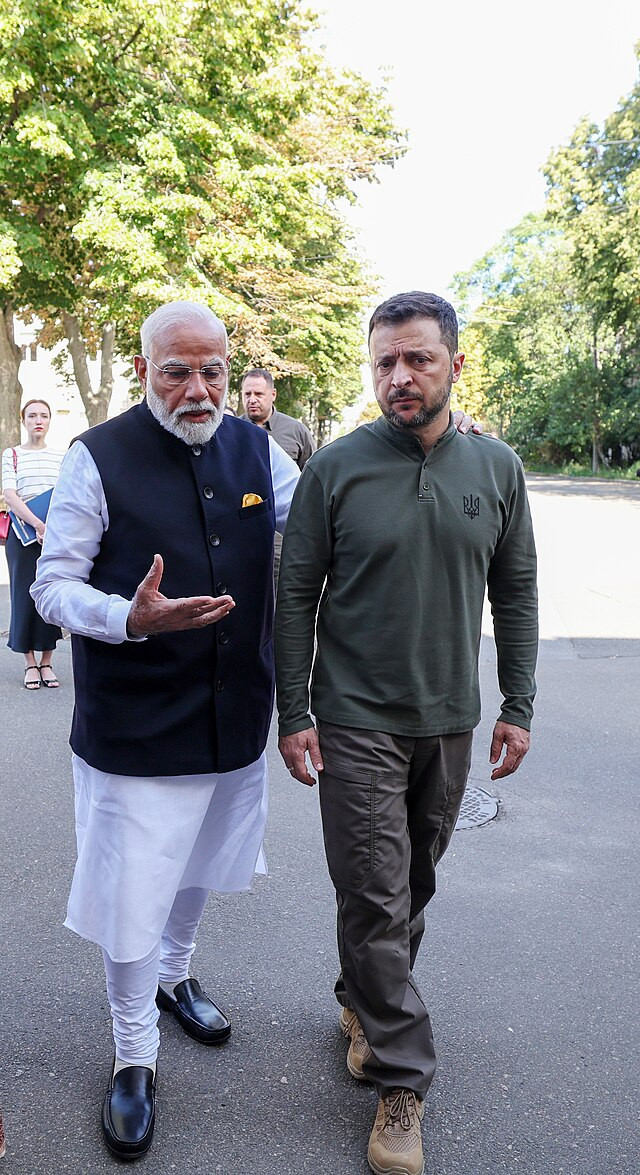Indian Prime Minister Narendra Modi made a historic visit to Kyiv on Friday, where he urged Ukrainian President Volodymyr Zelenskyy to engage in peace talks with Russia to bring an end to the ongoing conflict. Modi offered to act as a mediator, emphasizing the need for dialogue and diplomacy to resolve the crisis that has gripped Ukraine since Russia's invasion in February 2022.
Modi's visit to Ukraine marks the first time an Indian prime minister has visited the country during such a turbulent period. The timing of the visit is particularly notable, as it comes just weeks after Modi met with Russian President Vladimir Putin in Moscow, where he similarly advocated for peace. Modi's call for negotiations has sparked interest, especially given India's traditionally close ties with Russia, both economically and in defense.
"The road to resolution can only be found through dialogue and diplomacy," Modi stated during his meeting with Zelenskyy. "And we should move in that direction without wasting any time. Both sides should sit together to find a way out of this crisis. I want to assure you that India is ready to play an active role in any efforts toward peace. If I can play any role in this personally, I will do that, I want to assure you as a friend."
Zelenskyy, while expressing appreciation for Modi's visit, maintained a firm stance on Ukraine's sovereignty and territorial integrity. In his evening address following the meeting, he emphasized that the priority for Ukraine remains a just and lasting peace, one that respects its borders and independence. "It is important to us that India remains committed to international law and supports our sovereignty and territorial integrity," Zelenskyy said, underscoring Ukraine's position that any resolution to the conflict must be on Kyiv's terms.
The visit comes at a critical juncture in the war, with Russia making incremental gains in eastern Ukraine while Kyiv conducts cross-border incursions. The conflict has drawn widespread international attention, with Western nations imposing severe sanctions on Russia. However, India has continued to strengthen its economic ties with Moscow, particularly in the energy sector, where Indian refiners have become major buyers of Russian oil.
Modi's outreach to both sides reflects India's strategic balancing act as it seeks to maintain relationships with Russia while also engaging with Western nations and other global powers. During the visit, Modi and Zelenskyy spent two and a half hours in closed-door discussions, after which they signed cooperation agreements in agriculture, medicine, and culture. The joint statement highlighted the importance of closer dialogue to ensure a comprehensive, just, and lasting peace.
Despite the diplomatic gestures, some observers remain skeptical about the impact of Modi's visit. Analysts note that while Modi's involvement could signal a shift toward a more neutral stance, the deep-seated complexities of the Ukraine conflict make a quick resolution unlikely. Ukrainian political analyst Yurii Bohdanov described the visit as "the beginning of a complex dialogue between India, Ukraine, and Europe," emphasizing that establishing a strong relationship with India will be a long and challenging process.
The significance of Modi's visit was further underscored by a symbolic moment when both leaders visited a memorial dedicated to the hundreds of Ukrainian children who have lost their lives in the conflict. Modi and Zelenskyy laid teddy bears at the memorial, observed a moment of silence, and expressed their condolences to the grieving families. "Conflict is particularly devastating for young children," Modi wrote on social media, reflecting on the tragedy of war.
Modi's visit also included interactions with the Indian diaspora in Ukraine and a tribute at the Mahatma Gandhi Monument in Kyiv. Andriy Yermak, the chief of Ukraine's Presidential Office, described the visit as historic and reiterated Ukraine's hope that India could play a role in achieving peace. "We respect India as a very big democracy in the world and a powerful country," Yermak said, adding that it is now crucial to identify the aggressor and the victim in this conflict.




